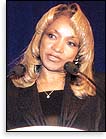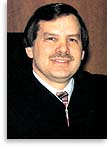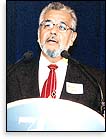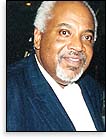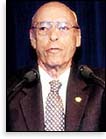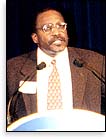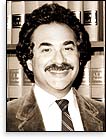

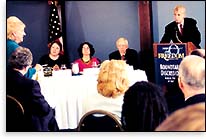
|
 |
Freedom’s 30th Anniversary celebration held in Washington, D.C. included a panel discussion on child drugging, moderated by Citizens Commission on Human Rights national president Bruce Wiseman, and on the media and human rights issues, moderated by nationally syndicated columnist Alexander Cockburn.
|
 |
In Support of Human Rights
Human rights leaders from Los Angeles receive awards during Freedom’s 30th anniversary year.

even diverse Los Angeles residents with a common denominator of stellar achievements in the field of human rights were among those to receive Freedom Magazine’s Human Rights Leadership Award over the past year.
As part of Freedom’s mission to advance fundamental rights and freedoms, the editors initiated a feature in the magazine in 1987 to acknowledge leaders in the field of human rights. Human Rights Leadership Profiles highlight such individuals’ exemplary and sometimes extraordinary work and accomplishments.
From the profiles came the Freedom Human Rights Leadership Awards, presented to individuals in the forefront of efforts to advance the cause of freedom of expression, freedom of information, government reform, mental health reform, children’s rights, religious freedom and social justice. The first awards presentations were held in Los Angeles in 1989.
Through continuing awards to those who are improving conditions in society, positive contributions to our civilization and to the welfare of mankind are acknowledged.
Three decades after it was first published in England in 1968, Freedom – with its flagship magazine in the United States and 18 more editions worldwide, including the Los Angeles edition — marked its 30th anniversary with a celebration at the National Press Club in Washington, D.C. in late 1998.
With actress Anne Archer as Mistress of Ceremonies, the program included speeches by Freedom’s editor in chief and the president of the Church of Scientology International. An extraordinary performance by Oscar-winning rhythm and blues composer Isaac Hayes and seven-time Grammy winner and jazz great Chick Corea highlighted the events.
The events culminated in Freedom Human Rights Leadership Awards presentations. Further awards were then presented in Los Angeles in May 1999.
In this local edition of Freedom, we feature those men and women from our city who received their awards in Washington, D.C. and in Los Angeles.
Los Angeles Awardees
Ernestine Peters
When the National Association for the Advancement of Colored People was founded in 1909, its purpose was to prevent organized violence against blacks and obtain the passage of anti-lynching laws. As times have changed, the NAACP has shifted its focus to seeking equal treatment in the press, the courts, the schools, and the minds and hearts of America.
While growing up in profoundly segregated Memphis, Ernestine Barlow Peters knew firsthand the need for the NAACP. One of 10 children in a poor family, she attended a segregated school and knew empirically the definition of “discrimination.” She was still a child when she realized segregation was neither natural nor necessary. At a young age, she began her efforts on behalf of the NAACP.
Her work today includes the nationally televised NAACP Image Awards, among whose 1998 honorees were composer and producer Kenneth “Babyface” Edmonds, director Stanley Kramer, actor Dijmon Hounsou, actress Vanessa Williams and U.S. Secretary of Labor Alexis Herman.
Peters created the NAACP Affirmative Action and Diversity Career Convention, otherwise known as the NAACP Job Fair, now in its 11th year. Corporate sponsorship provides job seekers interview opportunities with the Los Angeles Police Department, DreamWorks Studios, Enterprise Rent-A-Car, Los Angeles Unified School District, Aerospace Corporation, Media One, Sony Pictures and other employers. The Job Fair provides the open door to job and career opportunities.
Peters conceived and coordinated many such projects — all while also running two NAACP regional districts that encompass 16 states and two foreign countries.
She has been unceasing in her efforts to secure equal rights and equal opportunity for all people.
Judge Rudolph A. Diaz and Judge Stephen A. Marcus
Judge Rudolph (“Rudy”) Diaz and Judge Stephen Marcus have spent their adult lives in the legal arena, upholding not just the letter of the law, but its spirit. As judges, respectively, of the Rio Hondo and Los Angeles Municipal Courts, they have defined justice not as an act of socially sanctioned revenge or punishment, but rather as those actions which can make a healthier, saner civilization.
Never satisfied to merely issue judgments, both judges’ interests lie in the communities that generate the crimes they review each day. And realizing that imprisoning a drug addict does not solve drug addiction and its many attendant problems, both judges became instrumental in bringing Drug Courts to Los Angeles for drug-related and drug-addicted offenders.
To finish the Drug Court program, one must completely come off drugs. The program includes court monitoring, drug testing five times a week and counseling. The offender must test drug-free for six months before graduating. As related to Freedom by Judge Diaz, the cost of this program yearly per person is $1,200, compared to the $25,000 or more it costs to keep that same person in prison — where the drug problem not only remains unresolved but often becomes worse.
As described in literature published by the Rio Hondo Drug Court, “Drug Court philosophy recognizes the optimum time for intervention and treatment is when the defendant is most highly motivated, i.e., when in custody or facing a state prison sentence. By securing the defendant’s release from custody, and insisting on an immediate treatment plan ... the program can achieve a period of sobriety and stabilization from which the defendant can begin the long-term process of treatment for the self-destructive tendencies of drug abuse, and for improving the defendant’s self-esteem.”
Judge Marcus described the concept to Freedom as “tough love” — the individual is compelled to undergo treatment in his own best interests. “The Drug Court judge must be part big brother, cheerleader and taskmaster,” he stated.
Through their efforts, Judges Diaz and Marcus are improving the lives of those who come before them and of the community at large by removing addicts and returning rehabilitated and useful individuals — taking steps to facilitate the end of the drug problem, one victim at a time.
Theodore A. Eagans
Theodore (“Ted”) Eagans has worked for more than 30 years in the field of human rights. Becoming personally involved in human rights movements from the Philippines to Africa, from America to Germany, Eagans made it his business at an early age to see human rights protected, to find common ground between battling parties that might resolve enmity in peaceful agreement, and to make others aware of human rights abuses wherever they occur.
A negotiator with the mind and background of a highly trained and skilled attorney, Eagans’ perspective and counsel has been sought by the United Nations Human Rights Centre, the U.N. Special Rapporteur on Racism and nongovernmental agencies throughout Africa, Asia, Europe and the Americas.
Knowing that future peace lies in our children’s hands, Eagans founded Lift Every Voice, Inc. (LEVI), a nongovernmental organization that identifies students who have exhibited a compelling interest in peaceful resolution to global problems. LEVI sponsors these youth on an intensive program in Geneva, where they are exposed to the various workings of the United Nations. By the time they return home, these students are involved in the UN process and committed to opening global communication and maintaining human rights.
LEVI has also sponsored seminars, bringing leaders together from around the world to review human rights abuses and possible methods of united action to resolve them. Civic and religious leaders and representatives from the United Nations and nongovernmental organizations have attended these LEVI-sponsored meetings of the minds where new alliances are formed and new ideas born to combat violations of human rights.
Irving Sarnoff
During years of human rights activism and outspoken opposition to abuses of human dignity, Irving Sarnoff saw repeatedly how solutions and a pattern for a world at peace were already provided in the Universal Declaration of Human Rights and other fundamental documents of the United Nations. The task, he realized, lay in getting the Declaration widely known, understood and applied.
Sarnoff has consistently worked to put this concept into action. He has served as founder and director of the Southern California Alliance for Survival, the Southern California Peace Action Council, the Mississippi Assistance Project and the Inter-Faith Council for the United Nations.
Sarnoff stood as a delegate to the World Assembly of Religious Peaceworkers in Tokyo and the World Assembly for Peace in Prague. He acted as executive producer and conceptualizer for a series of events in support of the United Nations, culminating in 1982 in Peace Sunday at the Rose Bowl, attended by 100,000 people.
In 1985, Sarnoff founded the Friends of the United Nations, whose purpose is to promote the spirit and vision of the U.N. Charter and to encourage participation from all sectors of society in the United Nations’ goal of a peaceful, flourishing planet.
This organization works with the United Nations and U.N. nongovernmental organizations, sponsoring briefings throughout the United States on the work of the U.N. Through coalitions created with artists and the entertainment industry, the advertising industry, educational workers and legislators, Friends of the United Nations helps to keep people informed of U.N. activities, goals and accomplishments.
Reggie Berry
Born into a family of athletes, Reginald “Reggie” Berry led his high school to state championships in football, baseball and track and to all-conference awards in football and basketball. He proved early in his life that he knew how to compete and to win.
He received an academic scholarship to New York City College and full football scholarships to three universities. He was a defensive back with the San Diego Chargers in the NFL, where he won several special team awards. He continued to play football until injuries forced his retirement. It was football’s loss, but a victory for hundreds of children.
Berry returned to school, receiving a degree in sociology while working on his teaching credentials. He then accepted a position with the NFL Retired Players Association’s Goals For Youth Program, which helps at-risk migrant students. While doing this work, Berry was approached by the NFL to start a new program, Goals for Life, directed at all at-risk students, regardless of their background.
Founded in 1989, Goals for Life enlists the aid of both retired and active athletes, mentoring students who are most at need. Dozens of concerned pro athletes have spent 24 weeks in a given school, working intensely with students in a program that is highly acclaimed by faculty, administrators, students, parents and support groups throughout California. Under Berry’s watchful leadership, Goals for Life requires that its student participants remain drug-free. Over 1,500 students have so far been assisted by pro athletes in this intensive program.
Former Dallas Cowboys coach Tom Landry applauded Goals for Life, calling it “a tremendous program” and noting that “Goals are the targets that make successes, whether it’s in football, or anything else.”
Barry Fisher
In 1981, Judge Irving R. Kaufman, writing for the U.S. Court of Appeals for the 2nd Circuit in New York, wrote that “Tolerance of the unorthodox and unpopular is the bellwether of a society’s spiritual strength.”
Judge Kaufman was writing on a decision striking down a regulation which restricted religious solicitation on the New York State Fairgrounds. His words seem to express succinctly the view which has driven Los Angeles attorney Barry Fisher — who won the 1981 ruling and scores of others like it, both before and after — to be one of the nation’s foremost advocates for tolerance and religious rights.
Operating from the Los Angeles law firm he helped found 20 years ago, Fisher and his partners have served as counsel on nearly 300 reported state and federal cases, including a dozen before the U.S. Supreme Court. Fisher has focused his practice and his life on the establishment and free exercise clauses of the First Amendment.
The National Council of Churches has called Fisher one of the “top two dozen” First Amendment experts in the nation. His clients have included gypsies, American Indians, prison inmates, Jehovah’s Witnesses, Hare Krishnas and members of the Unification Church. As he has said himself, “I am drawn to minority groups which have been unjustly attacked.”
Some of the most important cases involving religious issues bear Fisher’s stamp. In 1987, he won a ruling from the U.S. Supreme Court striking down a ban on soliciting at Los Angeles International Airport, concluding that the regulation went too far in limiting the right to free speech.
He was also instrumental in obtaining the passage of a watershed first amendment bill, on the books as California Civil Code section 425.14, which protects religious organizations from frivolous and vindictive punitive damages claims.
Some of his most meaningful contributions may be those which reach beyond the borders of the United States. He has been involved in drafting constitutions and other legislation for countries such as Moldova, Albania and Belarus. He has been sought after and consulted by scholars, politicians, judges and others on matters of constitutional law.
Freedom magazine’s coverage over the years has focused on societal and government corruption, investigating to determine sources and causes, and bringing their findings — and solutions — to the public.
Some of the issues on which Freedom has taken the lead include the use of chemical and biological warfare agents on unwitting citizens and the notorious behavioral experiments conducted by military and intelligence agencies; domestic intelligence operations against law-abiding U.S. citizens for the purpose of political advantage — including the infamous enemy lists of the IRS and the counter-intelligence program of the FBI; Nazi involvement with the international criminal police organization Interpol; the oppression of religious liberties; true stories behind Jonestown and Waco; abuses, deaths and insurance fraud in the mental health system.
(Write for a complimentary copy of Freedom’s 30th anniversary commemorative edition at Freedom Magazine, 6331 Hollywood Blvd., Los Angeles, California, 90028.)
|







